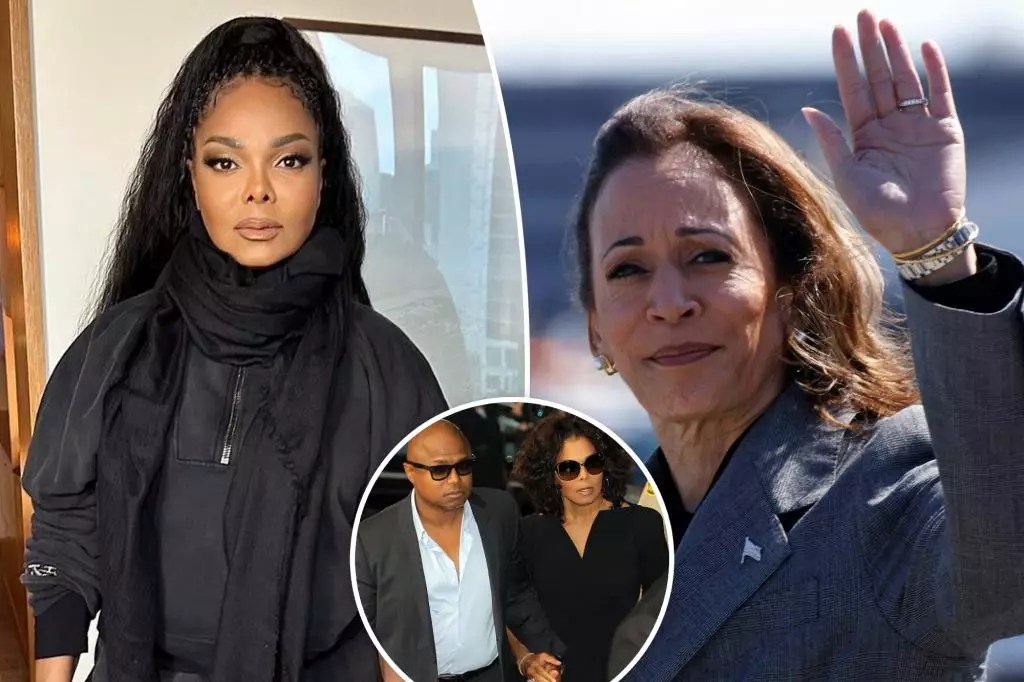Janet Jackson, a titan in the music industry known for her anthems about empowerment and social justice, finds herself at a crossroads. Recently, her comments regarding Vice President Kamala Harris sparked an uproar, causing many to question not only her statement but also the company she keeps. As criticisms about her remarks flooded social media platforms, concerns arose regarding her brother Randy Jackson’s influence on her career. This article delves into the implications of her statements, the management of her public image, and the staunch debate over control that appears to permeate Janet’s life both personally and professionally.
The controversy ignited when Janet expressed doubts about Harris’s racial identity during an interview with the Guardian. Despite Harris’s established background as a Black and South Asian woman, Janet suggested that Harris was not authentically Black, citing her father’s race inaccurately. This comment was not just a misstep; it contradicted years of advocacy Janet has demonstrated as an artist dedicated to uplifting marginalized communities. The public’s backlash was both swift and severe, spotlighting a dissonance that could potentially jeopardize Janet’s carefully built reputation.
Many believe this episode could resonate longer than her infamous “Nipplegate” incident during Super Bowl XXXVIII. Her remarks, previously inconceivable from someone who has championed for equity, left fans and critics alike perplexed. How could an artist whose music invites unity falter in such a public and damaging way? Central to this predicament is the role of her inner circle and the handling—or mishandling—of her public relations.
Insiders have suggested that Randy Jackson, both Janet’s brother and manager, has had an outsized role in the controversy. Critics argue that his inexperience is ill-suited for the delicate nature of Janet’s public image and brand management. The miscommunication and chaos that followed Janet’s comments indicate possible disconnects between her and her management team, particularly as social media influencers and public figures swiftly condemned her statements.
Janet’s decision to place her trust in Randy has raised eyebrows. Many wonder how someone with no high-profile experience could steer such a powerful figure in the industry, especially during a time when public perceptions can shift overnight. The consensus among those close to Janet seems to suggest that Randy’s approach lacks the savvy required for team leadership in a public relations crisis—an issue that could, unfortunately, define Janet’s legacy if not managed meticulously.
The aftermath of Janet’s comments exhibited glaring inconsistencies within her camp. Apologies were issued and retracted, indicating serious miscommunication among her team. The chaotic nature of these responses can be traced to a lack of cohesive strategy. Furthermore, individuals like Mo Elmasri, who proclaimed to represent Janet, only added to the turmoil. Claims about the management structure, with no known consensus on who officially represents Janet, have only complicated matters further.
This lack of clarity regarding her public representation adds layers of confusion that fans and followers might perceive as apathy or incompetence on Janet’s part, which is particularly damaging for someone so revered in the music industry. Significant concern looms over her commitment to her artistry, especially since her reported lack of recent recording indicates a standstill in her creative output.
While Janet’s recent commentary and the ensuing chaos may overshadow her artistic contributions, they evoke deeper questions about her identity as an artist. With her steadfast themes addressing race, empowerment, and social injustices, it seems at odds that she would wade into controversies that run counter to her established values. As one insider remarked, “It’s unlike her to say something so reckless,” highlighting the anomaly of her comments against her legacy.
Moreover, Janet’s admission about not releasing the “Black Diamond” album amid the pandemic echoes a broader narrative about creativity during times of crisis. With the music industry undergoing substantial shifts, Janet’s management decisions—or the perceived lack thereof—could be seen as not just poorly timed but also fundamentally misguided.
In a world where public figures are scrutinized more than ever, Janet Jackson’s recent misstep serves as a cautionary tale. With her artistic integrity on the line and her public image in flux, the importance of strong, experienced leadership within her management team rings louder than ever. As she prepares for a new residency and continues with her tour in London, Janet must navigate this tumultuous period with a tactful approach—one that prioritizes her voice while reassessing the influence of those around her. Ultimately, this chapter in her life could either reinforce her resilience or mark a turning point that challenges everything she stands for in the eyes of her fans.







Leave a Reply